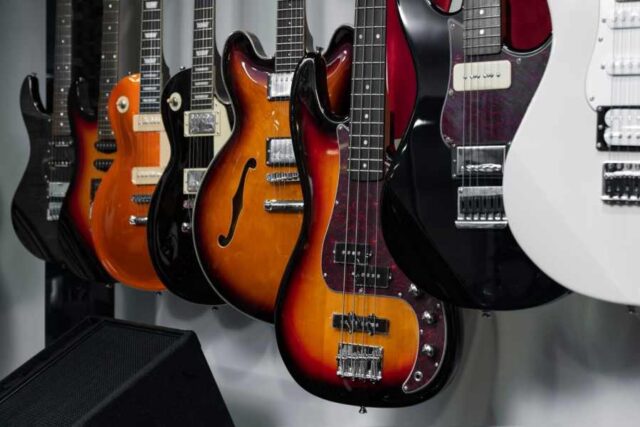If you’ve ever stepped into a guitar store and reached for the nearest Les Paul only to be met with eye rolls when playing Stairway to Heaven, you’re not alone. The infamous Led Zeppelin classic is arguably one of the most beloved and overplayed songs in guitar history. But that begs the question: why can’t you play Stairway to Heaven in a guitar store without someone groaning or shutting you down?
The phrase has become a meme, a cultural in-joke among guitarists, and even part of retail folklore. Some believe it’s about copyright. Others say it’s about sheer annoyance from hearing the same opening riff thousands of times a week. While the law doesn’t ban the song, guitar shops and their employees have developed their unspoken etiquette, and Stairway somehow made the “do not play” list.
This article explores the phenomenon’s humorous, historical, and practical reasons. We’ll dive into how this song earned its infamous status, what guitar store employees think, and whether there’s any truth behind the rumors. We’ll also touch on the “forbidden riff” joke made popular by the movie Wayne’s World and how internet culture helped fuel this myth.
So, whether you’re a newbie guitar player or a veteran shredder, this guide will answer why you can’t play Stairway to Heaven in a guitar store—and what you might want to play instead.
Why can’t you play Stairway to Heaven in a guitar store?
You technically can play Stairway to Heaven in a guitar store, but it’s widely discouraged because it’s overplayed and seen as cliché. The real reason lies in store culture and employee fatigue, not legal issues. It’s become a long-running joke among guitarists thanks to Wayne’s World, turning the song into a “forbidden riff” symbol in music shops.
The Origins of the “Stairway Ban” and Guitar Store Culture
The idea that you can’t play Stairway to Heaven in a guitar store has nothing to do with copyright laws—it’s a cultural phenomenon rooted in decades of repetition. Since its release in 1971, Stairway to Heaven has become a staple for aspiring guitarists. The song’s iconic opening riff is instantly recognizable and relatively simple to learn, making it a favorite for players trying out new guitars. But that very popularity also made it a headache for guitar store employees, who had to hear it played—often poorly—daily, repeatedly.
The turning point came in 1992 with the release of Wayne’s World. In one memorable scene, the main character is stopped mid-riff by a sign that reads, “No Stairway. Denied!” That brief joke cemented the song’s status as a punchline among musicians. Since then, forums, memes, and social media—including design trends like the viral use of the papyrus font generator—have amplified the humor surrounding overused clichés. Though there’s no absolute rule against playing the song, it has become the ultimate “forbidden riff,” joining the ranks of other overplayed classics like Smoke on the Water and Sweet Child o’ Mine.
Is It Illegal to Play Stairway to Heaven in a Guitar Store?
Playing Stairway to Heaven in a guitar store isn’t technically illegal, but it carries a reputation that’s hard to ignore. What started as a cultural joke has sparked myths about copyright, etiquette, and musical taboos.
Breaking Down the Copyright Myth
One of the biggest misconceptions surrounding the so-called “Stairway ban” is that it’s rooted in copyright law. In reality, no legal restriction prevents anyone from playing Stairway to Heaven in a guitar store. Copyright infringement applies to public performances or recorded versions used commercially, not casual strumming in retail. So no, you’re not breaking the law by playing those iconic notes while trying out a Strat.
The Role of Performance Licensing
Licensing becomes relevant only when a piece of music is performed publicly or commercially—think concerts, radio, or public broadcast. A guitar shop, where a customer is simply testing an instrument, doesn’t meet these criteria. Casual play isn’t considered a public performance, so it doesn’t require a license under current copyright standards.
Why Stores Still Discourage It
Even though it’s legal, playing Stairway to Heaven is still discouraged in many guitar stores. The reason is purely cultural. Sales staff and regular customers have heard the song’s opening riff so often that it’s become tiresome. It’s not about legality—it’s about etiquette, originality, and respecting shared space.
Other Songs That Made the “Forbidden” List
Stairway to Heaven isn’t alone in this fate. Songs like Smoke on the Water, Wonderwall, and Enter Sandman have also reached meme status for being overplayed by new guitarists. Their ubiquity has earned them a place on the unofficial “don’t play this here” list.
The Impact of Internet Jokes
Thanks to memes and viral videos, the joke has taken on a life of its own. Many beginners now avoid playing Stairway to Heaven altogether—not out of fear, but because they don’t want to seem like they’re lacking creativity or awareness.
Why Can’t You Play Stairway to Heaven in a Guitar Store? Explained in 6 Reasons
The question “why can’t you play Stairway to Heaven in a guitar store” has become legendary in music circles. While there’s no actual law against playing the song, there are several strong cultural reasons why it’s best to avoid it. Here’s a breakdown of why this iconic Led Zeppelin track is considered off-limits in many guitar shops:
- It’s Overplayed: Guitar store employees hear Stairway to Heaven multiple times a day, especially from new players. The sheer repetition has made it more of an annoyance than a showcase of talent.
- It’s a Beginner Favorite: The song’s intro is often one of the first riffs learned by budding guitarists. Unfortunately, it’s also frequently played out of tune or with sloppy timing, which can irritate staff and other customers.
- The Wayne’s World Effect: The famous “No Stairway” scene from the 1992 film Wayne’s World helped turn the song into a punchline, reinforcing its reputation as a musical cliché.
- Meme Status: Internet jokes and memes have dubbed it the “forbidden riff,” further cementing its cultural status as something to avoid in public guitar-playing scenarios.
- Lack of Originality: Playing such a well-worn tune signals a lack of creativity, especially in a setting where originality is appreciated.
- Peer Pressure and Store Etiquette: Guitar culture subtly teaches new players to steer clear of overplayed songs. Avoiding Stairway shows respect and self-awareness.
Guitar Store Etiquette and the Rise of the Forbidden Riff
In most guitar shops, there’s an unspoken code of conduct. These rules aren’t posted, but regulars and employees know them well. Loud noodling, overuse of distortion, and playing iconic songs like Stairway are quietly frowned upon. This isn’t about policing creativity—it’s about creating a comfortable, respectful environment. Trying out a guitar is expected, but doing so thoughtfully earns more respect. Staff appreciate when customers show original riffs, soft playing, or ask before cranking the volume.
As the “forbidden riff” idea gained traction online, it became a form of hazing in the guitar world. New players are warned not to play Stairway, not because it’s bad, but because it shows a lack of awareness. Understanding store etiquette reflects musical maturity, so many simply avoid playing Stairway to Heaven in public stores.
What Should You Play Instead of Stairway to Heaven?
You’re not alone if you’re wondering what to play instead of the overused Stairway to Heaven riff. Many guitarists want to avoid the dreaded eye roll from store employees or fellow musicians. Luckily, plenty of impressive and respectful alternatives can showcase your skills without diving into cliché territory. Here are some great options to consider:
- Use a Simple Blues Progression: Blues is timeless and widely appreciated. Running through a basic 12-bar blues progression or throwing in some expressive licks shows musicality and control without being flashy or annoying.
- Try Fingerstyle Melodies: Soft fingerpicking patterns or classical-style melodies can highlight your technical ability and tone. They’re often quieter and more pleasant in a public store environment.
- Experiment with Original Riffs: Playing something you’ve created is always a win. It shows creativity and confidence, and lets you stand out from the crowd of players mimicking the same old songs.
- Play Jazz or Funk Chords: Stepping into jazz or funk territory can be a refreshing surprise in a rock-heavy setting. It shows versatility and a broader musical knowledge.
- Lightly Jam in Different Keys: Improvising in various keys or scales demonstrates strong theoretical understanding and fluidity on the fretboard—something employees will notice and respect.
Conclusion
The idea of why you can’t play Stairway to Heaven in a guitar store has more to do with guitar culture than any written rule. It’s not about breaking laws or disrespecting Led Zeppelin—it’s about consideration for the space, the staff, and the musical community. The song became so overplayed and memed that it now symbolizes a lack of originality more than musical skill. Playing it in a store has become a cliché, not a crime. Instead of falling into the stereotype, embrace the opportunity to showcase your creativity. Bring your style, explore new riffs, and make your guitar store visit stand out for the right reasons.
FAQ’s
Is there a rule against playing Stairway to Heaven in guitar stores?
No, there’s no formal rule. It’s more of a running joke in guitar culture, stemming from how often the song is played and how tired store staff are of hearing it.
Can I get in legal trouble for playing Stairway in public?
Not at all—unless you’re performing it commercially, charging admission, or broadcasting it. Playing it casually in a store is entirely legal under copyright law.
Why did Wayne’s World say “No Stairway”?
The film used the line as a humorous jab at the song’s ubiquity. It captured the frustration of hearing Stairway to Heaven played poorly by countless beginners.
What other songs are considered “forbidden riffs”?
Besides Stairway, riffs like Smoke on the Water, Sweet Child o’ Mine, and Wonderwall are often considered “forbidden” because they’re frequently played in music shops.
What should I play instead in a guitar store?
Opt for original riffs, soft blues lines, or jazzy chord progressions. These choices show creativity, musicality, and awareness of store etiquette—all things staff appreciate.














